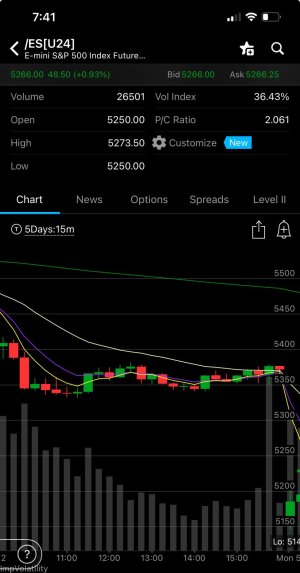I have all my $ in a couple vanguard mutual funds but lately I’ve been thinking about opening a Roth and moving some there. It would be worth it to the tax benefits right? For my mutual fund I knew you paid taxes on gains but thought it was only when you withdrew

I didn’t realize I was paying the past couple years
if I open a Roth also with vanguard and move my money there I would be able to reinvest in the same mutual funds right? But I would lose my entry positions from 2 years ago?
i don’t have any new $ to deposit so I would be transferring from my mutual fund to max out the Roth, at least for this year
You need to follow up with your own research because I'm only going to touch on the basics, and my information may not be 100% correct or current (I'm not an expert, things change every year, and there are different rules based on your age & income). But this should put you on the right track.
You can't transfer your mutual funds to an IRA (Individual Retirement Account), you would sell your mutual funds, and then invest into an IRA (Regular or Roth) with that money. If you love using Vanguard you can continue using them to open up an IRA, but if you're not married to them then I recommend using one of the "Big Four" brokerages (Fidelity, Charles Schwab, E*Trade, TD Ameritrade). In my humble opinion Fidelity is the absolute best of the best. They are old (70+ years in business), extremely professional, offer great customer service, and offer the most free research. And you can purchase various Vanguard ETFs and Mutual Funds through them (VOO, VTI, VNQ,VYM, VGT, VWO), although their Fidelity ones are arguably even better (I love FBGRX).
There are two types of IRAs (Individual Retirement Account),
regular IRA and Roth IRA. The most you can contribute to either is up to $6000. You have until April 15th (tax deadline) to contribute for the previous year, so right now you could still contribute $6000 for 2020 and another $6000 for 2021. Both options offer tax breaks. With a regular IRA, you get the tax break on the front end by deducting it on your taxes, reducing your tax liability. However, once you withdraw your funds you will be taxed. A Roth IRA does not offer any tax deductions. However, when you withdraw your Roth IRA it will be tax-free (even the earnings) as long as you've had the account for at least 5 years.
You have to remember though, these are
retirement accounts. That means you can't withdraw from them until you're 59 1/2, or you'll incur a 10% penalty. There are some exceptions you should get acquainted with (for example, you can withdraw I believe $10K penalty free if you're purchasing a new home, and you can withdraw penalty free if it's a medical emergency).
If you have an employer, do they offer a company-sponsored retirement fund (401K, Roth 401K, )? If so, and if you don't already utilize it, you may want to consider it. You can have a 401K
and an IRA if you want. A Roth 401K is similar to a Roth IRA in that it'll be tax-free when you withdraw. A regular 401K is slightly different to an IRA in that you won't get a tax deduction since the funds put into the 401K are pre-tax already. A few advantages of a 401K over an IRA: max contribution limit is $19,500 instead of $6,000, and some employers match contributions. This "match" is pretty much free money. Every company is different. Some don't offer any retirement plans. Some offer retirement plans but don't match at all. Some will match 50% or 100% of your contribution up to a certain amount of your salary (3% to 6% is common). So an example, let's say you make $1,000 a week before taxes. Let's say your company offers to match 100% of your contribution for up to 6% of your salary. 6% of your salary (remember, $1,000 a week) is $60. So anything you contribute to your 401K up to $60 weekly, your company will put a matching amount into your 401K too. You
could (and should, if possible) contribute more to your 401K, but the company will only match up to the amount they've agreed to (again, 6% in this example). Free. Money. FREE!
Since every employer is different, retirement plans offered (and any matching) is something to keep in mind when considering a new job. It is considered a "benefit," like health insurance or dental. So back to the $1000/week example, your regular salary would be $52,000 at a company with no 401K matching, but at a company that offered 6% match your salary would effectively be $55,120 ($52,000 + $3,120) if you took advantage of the matching.
One last advantage of a 401K. It's harder psychologically for people to take money from their savings account to fund an IRA. It's just easier for most people mentally for it to be automatically deducted from their paycheck. Depending on the amount, over time you may not even notice the deduction much, if you adjust accordingly (less frivolous spending). Obviously if someone's paycheck barely covers rent/food then this isn't true, but for a lot of people it's doable.
Let me know if you have any questions.


 I didn’t realize I was paying the past couple years
I didn’t realize I was paying the past couple years


































